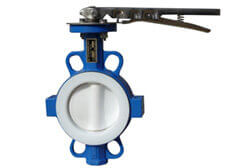Design, Function of PFA Lined Wafer Butterfly Valves

In industries that deal with aggressive chemicals and high-pressure fluids, choosing the right valve is key to ensuring both safety and performance. One valve that meets these critical requirements is the PFA lined wafer type butterfly valve. This valve is known for its high resistance to corrosion, ease of installation, and reliable shut-off capabilities. In this blog, we’ll explore the design, function, benefits, and applications of PFA lined butterfly valves, and how they compare with FEP lined butterfly valves.
What is a PFA Lined Wafer Type Butterfly Valve?
A PFA lined wafer type butterfly valve is a quarter-turn valve used to regulate or isolate the flow of fluids. The main feature that sets it apart is its PFA (Perfluoroalkoxy) lining. This lining provides outstanding chemical resistance and protects the internal parts of the valve from corrosion and wear.
The term “wafer type” refers to the way the valve is installed between two pipe flanges. This design is compact, easy to install, and cost-effective. Because of these properties, this type of butterfly valve is widely used in the chemical, pharmaceutical, water treatment, and food processing industries.
Key Components and Design
Understanding the design of the PFA lined wafer type butterfly valve helps you appreciate its durability and efficiency. The main components include:
1. Body
The valve body holds all other parts and provides mechanical support. It is usually made from cast iron or stainless steel and is internally lined with PFA to shield it from corrosive media.
2. Disc
The disc is the rotating element that opens or closes to control the flow of the fluid. It is also lined or coated with PFA to provide chemical resistance.
3. Shaft (Stem)
Connected to the actuator or handle, the shaft controls the movement of the disc. It must be strong and corrosion-resistant to ensure long-term use.
4. Seat
The seat provides the seal between the disc and the body to prevent leakage. In PFA lined butterfly valves, the seat is usually made of elastomer or PTFE with a bonded PFA layer.
5. Lining (PFA)
The PFA lining covers all parts in contact with the fluid. It is the key material that resists chemicals and ensures smooth operation.
6. Wafer Connection Design
The valve is designed to fit between two standard flanges. The wafer type allows easy alignment and installation without extra support.
How Does the Valve Work?
The pfa lined butterfly valve works using a simple quarter-turn principle:
- Open Position: When the handle or actuator turns the shaft 90 degrees, the disc rotates parallel to the flow, allowing fluid to pass through.
- Closed Position: Rotating the disc back to a perpendicular position blocks the flow completely.
This quick and simple operation makes it ideal for on/off and throttling applications.
Benefits of Using PFA Lined Butterfly Valves
1. High Chemical Resistance
PFA is resistant to almost all types of corrosive chemicals, including acids, bases, and solvents. This makes the valve suitable for chemical processing plants and industries that deal with toxic or reactive fluids.
2. Smooth Flow
The non-stick and smooth surface of the PFA lining reduces the chance of clogging and pressure drops. It also minimizes contamination in sensitive processes.
3. Durability
The PFA lining protects the valve’s internal parts from erosion and corrosion, increasing its lifespan and reducing the need for frequent replacements.
4. Cost-Effective Maintenance
Thanks to the robust lining, these valves require minimal maintenance. This reduces downtime and lowers overall operating costs.
5. Compact and Lightweight
The wafer type design is compact and saves space in pipelines. It’s also easier to install and remove compared to other valve types.
Applications of PFA Lined Wafer Type Butterfly Valves
The PFA lined wafer type butterfly valve is used in a wide range of industries, including:
- Chemical Processing: For handling acids, alkalis, and solvents.
- Pharmaceutical: For maintaining purity and avoiding contamination.
- Food and Beverage: For sanitary fluid control.
- Water Treatment: In systems where water contains chemicals or impurities.
- Petrochemical: For oil, gas, and fuel handling with corrosive additives.
What About FEP Lined Butterfly Valves?
In some cases, you may come across a fep lined butterfly valve. FEP (Fluorinated Ethylene Propylene) is similar to PFA in chemical resistance but has slightly different properties.
Comparison:
| Property | PFA Lining | FEP Lining |
|---|---|---|
| Temperature Resistance | Higher (up to 260°C) | Moderate (up to 205°C) |
| Flexibility | More flexible and durable | Less flexible |
| Application Suitability | Best for high temp & harsh chemicals | Good for moderate chemical use |
| Cost | Slightly higher | More affordable |
Both types are excellent, but the choice depends on your process conditions, especially temperature and fluid type.
Why Choose a Lined Butterfly Valve Over a Metal One?
A metal valve without lining can corrode quickly when exposed to harsh chemicals, leading to leakage and system failure. Lined valves, especially with PFA or FEP, offer:
- Enhanced safety
- Extended service life
- Better sealing performance
- Resistance to scaling, fouling, and contamination
Maintenance and Inspection Tips
To keep your pfa lined wafer type butterfly valve working well:
- Regular Inspection: Check the lining for wear or damage.
- Operate Periodically: Rotate the valve occasionally if it’s left in one position.
- Avoid Over-Torquing: Don’t apply too much force when closing or opening the valve.
- Use Proper Installation Practices: Make sure the valve is centered between flanges to avoid lining damage.
Conclusion
The PFA lined wafer type butterfly valve is a strong, reliable, and cost-effective solution for fluid handling in challenging environments. Its chemical resistance, easy operation, and minimal maintenance make it a smart choice for many industries. Whether you’re managing aggressive chemicals or sensitive fluids, a pfa lined butterfly valve or fep lined butterfly valve offers the protection and performance your system needs.


